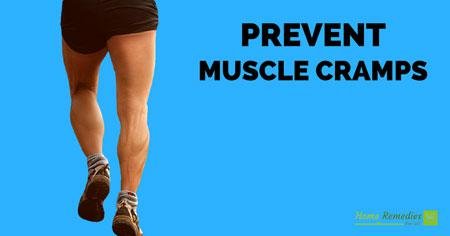If you get occasional muscle cramps then it is normal, however if you get muscle cramps more often than it is generally a reflection of nutrient deficiencies.
When you overexert your body or stay in any specific position for a very long period then you are likely to get muscle cramps. This type of muscle cramps are activity specific and do not imply any problem in your body. These are temporary problems and simple home remedies can solve such muscle cramps.
Let's look at a typical muscle cramp episode. Visualise that you become over excited about playing a new sport. You perhaps have a sedentary lifestyle, but all of a sudden you over exerted yourself in this new sporting activity you had begun to enjoy thoroughly. Suddenly you get muscle cramps and you can't play or enjoy the activity anymore.
Sounds familiar...
It is not just sporting activity but any other strenuous activity such as lifting heavy weight, sleeping in any specific position for a very long time, standing somewhere endlessly or having been sitting on your computer for a very long time, can cause muscle cramps.
All these activities can give you cramps depending on which muscles have been used or rather abused.
Let's see what happens...
How Muscles Function and Why You Get Cramps?
Every muscle in a motion situation contracts first and then stretches to complete the motion. When 1 muscle is doing a specific action contraction or stretch, the other muscle will do reverse action to continue the motion. So a specific muscle is contracting then at the same time another muscle will be stretching and this coordination of the network of muscles maintains the continuity of the motion. For example, while you are walking, networks of your leg muscles are alternately contracting and stretching to give you the required motion with the specific speed.
When muscles have not been used for a long period or they are used more than they are used to then some muscles may not stretch enough after contraction. This inability to stretch the muscle causes the cramp.
We are not looking at the tearing of muscles or damage of muscle in this article. That is a big subject on its own, so it will be discussed later separately. We are simply looking at the muscle cramps where your muscle is not damaged, it has just skipped an activity of stretching.
The ability of contracting and stretching of a muscle by any motion depends on how much nutrition the muscle is getting. Like any other body part, if the muscles are not getting enough nutrients then they will not function to their best abilities and gradually they will die.
What are the Main causes of Muscle Cramps.
As we have already seen that the unaccustomed physical overexertion strain can call muscle cramps. Following are some of the other related causes of muscle cramps
- Anaemia
- Smoking
- Inactivity
- Fibromyalgia
- Hormone imbalance
- Allergies
- Arthritis
- Dehydration
- Heat stroke
- Hypothyroidism
- Varicose veins
- Atherosclerosis
- Medication for high blood pressure heart disorders
All the above conditions can cause deficiencies of electrolytes minerals such as potassium calcium and magnesium leading to muscle cramps.
Deficiency of Vitamin E also leads to muscle cramps. Deficiency of Vitamin E reduces calcium absorption which can cause muscle cramps during standing or walking.
Deficiency of calcium and magnesium can cause leg cramps during sleep.
How to Prevent Muscle Cramps?

Let us begin with the first thing first. Dehydration is one of the key contributors to accumulate toxins in the muscles. So drink water every couple of hours to flush out those toxins from the muscles. You are surprised to know that there are 90% chances of you being dehydrated at any time. Most of us leading modern lifestyles get deprived of water. We simply don't feel like drinking more water, particularly when we live in busy schedules and an air conditioned environment.
Another important thing to remember is to warm up before undertaking any intense exercise. If you do not do that then you are inviting muscle cramps subconsciously.
If you're undertaking intense exercises after warm up, good. Even then apply virgin olive oil before and after the exercise and massage.
Take a warm salt bath before going to the bed. This will help improve blood circulation and prevent night leg leg cramping. After taking the bath, stretch those muscles, which are likely to get cramps in the night. This will give you double protection.
If you get cramps while walking and feel relieved when you stop, then you must consult a doctor. It may be happening due to atherosclerosis and your blood supply seems to have reduced.
So if you take all these precautions then you can really prevent and get relieved from the expected pain of the muscle cramps.

